Quinnatisset facts for kids
Quinnatisset (also known as Quantisset or Quattissick) was a village of the Nipmuc people in what is now Connecticut. It became known as a "praying town" because of the work of missionaries like John Eliot and Daniel Gookin.
Contents
Quinnatisset: A Native American Village
Quinnatisset was an important Native American village. Its name, "Quantisset," means "little long river." This name likely described a nearby waterway.
Where Was Quinnatisset Located?
The village of Quinnatisset was located in what is now eastern Connecticut. It was near the modern towns of Thompson, Connecticut or Pomfret, Connecticut. Some historians believe it was close to the area known today as the Thompson Hill Historic District. Quinnatisset was also about six miles south of Maanexit, which was another praying town.
Life in Quinnatisset
In the mid-1600s, Quinnatisset was a lively Nipmuc village. By 1667, the missionary John Eliot began working with the people there. He tried to help solve disagreements, such as a problem about payments between the Nipmuc people of Quantisset and the Narragansett leader Quaiapen.
Quinnatisset was also a place of spiritual importance. Before a major conflict called King Philip's War, a man named Daniel Takawambait served as a minister in the town. He was possibly the first Native American minister ordained in North America. In 1674, Daniel Gookin wrote that the people of Quantisset welcomed Daniel as their minister.
Changes Over Time
After King Philip's War (1675-1678), the land around Quinnatisset began to change hands. A Native American leader known as Black James sold thousands of acres of land in Quinnatisset to new settlers.
Even after these sales, signs of the Nipmuc presence remained. As late as 1730, a large wigwam (a traditional Native American home) was still visible on a hill. There was also a Nipmuc fort in Quinnatisset. This fort was attacked and destroyed, but the old cellar of the fort on "Fort Hill" can still be seen today.


